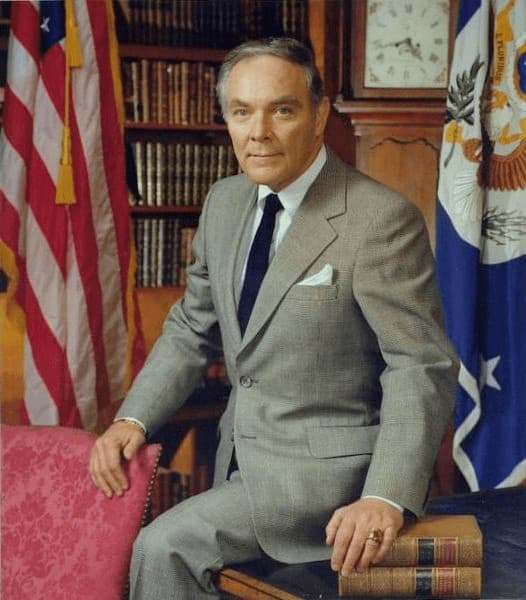Bureaucracies are often considered dry and difficult to navigate. However, every organization is only as good as the people who comprise it, and the U.S. Foreign Service is widely respected and admired because of the incredible individuals who form and lead it.
The humorous anecdotes below, narrated by several diplomats about their superiors, relay some of the most important qualities of leadership: losing gracefully, learning from one’s mistakes, and self-discipline.
Drafted by Sairah Aslam
Excerpts:
Richard Murphy
Manila, Philippines—Ambassador 1978–1981
Richard Murphy was interviewed by Charles Stuart Kennedy on December 6, 2017.
Read Richard Murphy’s full oral history HERE.
“I sat with [Secretary] Haig in his car after his side decisively lost the match.”
Served: The only secretarial visit I think was by Haig to attend a conference during the year he was Secretary. I had heard he was a dedicated tennis player so I proposed before he arrived that we set aside some time before the business day for tennis. I got a flat “no, he’ll be much too busy.” Then I got a follow up message to organize something. So I got two Filipino friends that I’d been playing with over the previous couple of years and opportunistically arranged that the stronger partner would be Haig’s. No-one would be the wiser. The plan was in full bloom when we got to the court that morning. The stronger one, Haig’s partner, took me aside to say he’d had an accident and his shoulder wasn’t right. He wanted to apologize in advance. I said to myself, “Oh my God!” I sat with Haig in his car after his side decisively lost the match. Driving with him back to his hotel I told him of the Manila Club downtown dedicated to the memory of General MacArthur. It had a quote from MacArthur above its front door saying: “It matters not whether you won or lost, but how you played the game.” He just looked straight ahead and growled, “MacArthur didn’t believe that either.” (Laughter)
————————————-
Thomas Donohue
Kuala Lampur, British Malay (Malaysia)—Political Officer, 1964–1965
Thomas Donohue was interviewed by Charles Stuart Kennedy on July 15, 2008
Read Thomas Donohue’s full oral history HERE.
“The tunku took all the ambassadors up to the Cameroon Highlands for a weekend, except one.”
Missing the cut: When Ambassador Baldwin arrived he came into a country that was absolutely seized by golf, and he let it be known that he was not a golfer. In a sense I think he thought it was sort of a [hobby], not realizing what he was walking into. Someone really had not briefed him in the Department, because he came out and he said, “I am not a golfer.” So he had been there about two months and the tunku (prime minister) took all the ambassadors up to the Cameroon Highlands for a weekend, except one. And I think it was on that Monday morning he took his first golf lesson. You would see him out there during the day and in the afternoon I’d be playing golf with somebody, and he’d say, “Hi, John,” waving from another fairway. But it was terribly important.
————————————————
John R. Davis, Jr.
Warsaw, Poland—Third Secretary-Vice Consul, 1956–1958
John R. Davis, Jr. was interviewed by Charles Stuart Kennedy on May 20, 1997
Read John R. Davis, Jr.,’s full oral history HERE.
“Art’s interviewing technique was to come in, sit down, and wait for the long silence to embarrass the other party into talking. Jake had exactly the same technique.”
A Meeting of Minds: Q: How did [Ambassador] Jake Beam operate?
DAVIS: Jake was wonderful. Of course he was the star of the Foreign Service, in every sense. Close-mouthed man, famously close-mouthed. Art Olsen was at that time the New York Times correspondent. Art’s interviewing technique was to come in, sit down, and wait for the long silence to embarrass the other party into talking. Jake had exactly the same technique. There was one famous instance where Art asked to see him to interview him. He came in and sat down, said hello, they said hello, they sat there a minute, two minutes. Jake got up, went over, opened up the office safe, the combination, carefully turned the handle, opened the safe, reached in, came out with a package of Fig Newtons. Closed the safe, twirled the dial, went back to his desk and ate one of the Fig Newtons. Another three minutes went by and Art Olsen said, “Thank you very much” and left.
Probably apocryphal, but sounds absolutely true.


